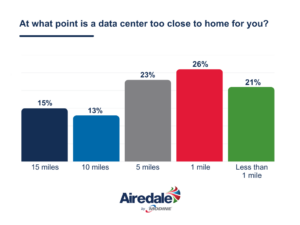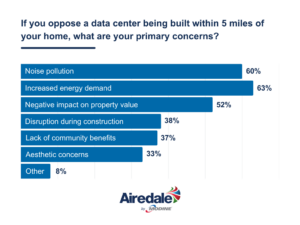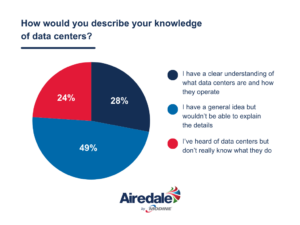Data Center Neighborhood Survey Report
When it comes to new data centers, most Americans say ‘Welcome to the neighborhood.’
A new Airedale by Modine survey reveals we are open to data centers in our communities – if developers prioritize sustainability and local engagement.
As data centers continue to expand to meet the growing demands of our digital world, public perception of these critical facilities is shifting. Unlike other large-scale infrastructure projects that often face community resistance – like power plants, cell towers, and manufacturing plants – data centers enjoy broad acceptance, even in residential areas. In fact, a significant portion of respondents in our recent Airedale Data Center Perceptions Survey expressed comfort with a data center being built within just a few miles of their home. This signals a pivotal moment for the industry: the conditions for responsible expansion are in place, and the opportunity to build with public support has never been stronger.
Considering the very public conversation and presidential pronouncements around the importance of AI and the follow-on conversations about the need for more data centers to support it, we wanted to know the public perception of data centers. We wanted to find out whether people supported the needed construction, what they’d expect from the companies building and managing those data centers, and, on a basic level, whether or not they understood the role of data centers and their importance to our shifting digital culture.
To get those answers we used the third-party platform Pollfish to ask those questions and more of 600 Americans 18 years old and older from March 7 to March 8, 2025. What we found was that while people recognize the necessity of data centers, they also have clear expectations. Concerns around energy consumption, noise, and community impact remain top of mind, and there is strong support for developers who contribute to local initiatives. At the same time, most Americans understand the role data centers play in maintaining the U.S.’s leadership in technology, internet reliability, and cloud computing. The results of this survey highlight both an open door for growth and the responsibilities that come with it—offering key insights for data center operators looking to expand in a way that earns trust and strengthens communities.
Key Findings
- 70% of Americans are comfortable with a data center within just a few miles of their home
- Many expect data centers to have a positive impact on their community in the next decade
- 55% support tax incentives to encourage data center development
- Noise pollution and energy consumption lead the list of concerns about data centers
- 62% said data center owners contributing to local initiatives would improve their perceptions of data centers as a whole.
- 59% believe data centers are essential for maintaining the U.S.’s global competitiveness in technology and innovation
Public Perception of Data Centers: A Cooling Perspective
Unlike many other forms of critical infrastructure, data centers don’t seem to spark the usual “Not in My Backyard” (NIMBY) resistance. While industrial developments often face fierce local opposition, our survey reveals a striking level of acceptance for data centers in residential areas. In fact, a solid 21% of respondents are perfectly fine with a data center within less than a mile of their home, while another 26% are comfortable with one at a distance of up to a mile. This broad tolerance suggests that, compared to factories, power plants, or even cell towers, data centers enjoy a level of public goodwill that could ease future expansion efforts.

Looking ahead, public expectations for data centers over the next decade are a mixed bag. Nearly half (45%) of respondents believe data centers will have a positive impact on their community, with 11% anticipating strong benefits and 34% expecting moderate gains. However, a significant 37% foresee no real impact at all, and 19% fear negative consequences – whether slight or severe. These divided opinions underscore ongoing concerns about the environmental footprint, land use, and energy consumption of data centers. Given that cooling technology is one of the biggest drivers of power usage, innovations in efficient and sustainable cooling could be a game-changer in shaping how communities perceive the industry’s presence in their backyard.
Tax incentives for data center developers – often a hot-button issue in infrastructure discussions – garner significant public support. A combined 55% of respondents back such incentives, with 17% strongly in favor and another 38% somewhat supportive. Meanwhile, 32% remain on the fence, signaling that a sizable portion of the public could be swayed by the right messaging and tangible benefits. Only 14% outright oppose these incentives, reinforcing the idea that most people see responsible data center development as a worthwhile investment – especially if it leads to job creation, sustainability commitments, and economic growth. For data center operators, this is a golden opportunity to position energy-efficient innovations as a critical piece of the responsible development puzzle.
 As the data center industry continues its rapid expansion, public sentiment will be shaped by both technological advancements and policy decisions. Cooling solutions that drive down energy consumption and reduce environmental impact have the potential to tip the scales in favor of greater community support. With nearly half of respondents neutral or only mildly positive about data centers, industry leaders have a unique chance to engage communities proactively – demonstrating how cutting-edge cooling technologies can make these facilities not just necessary, but beneficial neighbors.
As the data center industry continues its rapid expansion, public sentiment will be shaped by both technological advancements and policy decisions. Cooling solutions that drive down energy consumption and reduce environmental impact have the potential to tip the scales in favor of greater community support. With nearly half of respondents neutral or only mildly positive about data centers, industry leaders have a unique chance to engage communities proactively – demonstrating how cutting-edge cooling technologies can make these facilities not just necessary, but beneficial neighbors.
“This survey makes one thing clear: the public is open to data center expansion, and the time to build is now,” said Kimberly Raduenz, Marketing Manager – North American Data Centers, at Airedale. “Unlike other large infrastructure projects that often face resistance, data centers are largely seen as necessary and beneficial. With nearly half of respondents expressing no opposition to having one built near their home – and many recognizing their role in keeping the U.S. at the forefront of global innovation – the industry has a unique opportunity to scale responsibly. The demand for data storage and processing isn’t slowing down, and as we build for the future, it’s critical that we do so with an emphasis on sustainability and efficiency. Smart thermal management solutions will play a key role in making this expansion both viable and environmentally responsible.”
Addressing Concerns, Building Goodwill
When it comes to concerns about data centers, environmental impact tops the list. Among those opposed to having a data center built within five miles of their home, the leading worries are increased energy demand (63%) and noise pollution (60%). More than half (52%) also cite potential declines in property value, while 38% are wary of disruptions during construction. Aesthetic concerns and a perceived lack of community benefits round out the list. These findings highlight the importance of responsible development – particularly in managing energy efficiency, minimizing noise, and ensuring that data centers integrate seamlessly into their surroundings. As the industry continues to evolve, operators who proactively address these concerns through sustainable cooling technologies, soundproofing measures, and thoughtful site selection may find it easier to gain public support.

At the same time, the survey reveals a clear path for data center operators to strengthen community relationships: local investment. More than 60% of respondents said their opinion of data centers would improve – either significantly (17%) or somewhat (45%) – if owners contributed to community initiatives such as education programs and infrastructure improvements. Only a small fraction (4%) said such efforts would negatively impact their perception. This signals an opportunity for data center companies to move beyond simply being neutral neighbors and instead become active, valued contributors to the communities where they operate. Whether through job training programs, renewable energy investments, or direct support for schools and local infrastructure, data center operators have the potential to shift public perception and solidify their role as a positive force for economic and social progress.
A Nation That Understands the Role of Data Centers
Most Americans claim to have at least some understanding of what data centers are and why they matter – and the data suggests they’re largely correct. While only 28% say they have a clear understanding of how data centers operate, nearly half (49%) have a general idea, even if they couldn’t explain the technical details. Meanwhile, just 24% admit they’ve heard of data centers but don’t really know what they do, and notably, no respondents said they were completely unfamiliar. When asked about the purpose of data centers, an overwhelming 75% correctly identified their role in storing and processing digital information, while majorities also recognized their importance in supporting businesses (59%), enabling internet connectivity (52%), powering cloud computing and AI (48%), and securing IT infrastructure (54%). These results suggest that data centers, once an obscure part of the digital economy, have become widely recognized as essential infrastructure supporting everyday life.
 That recognition extends to the broader implications of data center expansion. Among those who support the growth of data centers in the U.S., 59% say their primary reason is maintaining the country’s global competitiveness in technology and innovation. Nearly half (46%) acknowledge that data storage and processing demands will only continue to rise, while 43% believe data centers directly improve internet speed and reliability and support advancements in AI and cloud computing. Some also see them as critical to national security (27%), the future of remote work and digital businesses (33%), and essential public services like healthcare and education (18%). While concerns about energy use and environmental impact persist, the fact that 11% of supporters trust that newer data centers will prioritize sustainability suggests that industry efforts to improve efficiency are being noticed. As digital infrastructure becomes increasingly vital to both economic growth and everyday life, the data center industry has an opportunity to reinforce public trust by continuing to innovate and communicate its long-term benefits.
That recognition extends to the broader implications of data center expansion. Among those who support the growth of data centers in the U.S., 59% say their primary reason is maintaining the country’s global competitiveness in technology and innovation. Nearly half (46%) acknowledge that data storage and processing demands will only continue to rise, while 43% believe data centers directly improve internet speed and reliability and support advancements in AI and cloud computing. Some also see them as critical to national security (27%), the future of remote work and digital businesses (33%), and essential public services like healthcare and education (18%). While concerns about energy use and environmental impact persist, the fact that 11% of supporters trust that newer data centers will prioritize sustainability suggests that industry efforts to improve efficiency are being noticed. As digital infrastructure becomes increasingly vital to both economic growth and everyday life, the data center industry has an opportunity to reinforce public trust by continuing to innovate and communicate its long-term benefits.
 “This survey underscores a fundamental shift in how people perceive data centers – not as an abstract piece of infrastructure, but as a critical backbone of our digital lives,” said Kimberly Raduenz. “The findings tell us that the public understands the role data centers play in everything from internet reliability to global competitiveness, and they’re largely supportive of responsible growth. At the same time, concerns about energy use and environmental impact remain top of mind, making it clear that future expansion must prioritize efficiency and sustainability. For industry leaders, this is both a challenge and an opportunity: those who invest in smarter, more sustainable cooling and power solutions will be the ones shaping the next era of data center innovation.”
“This survey underscores a fundamental shift in how people perceive data centers – not as an abstract piece of infrastructure, but as a critical backbone of our digital lives,” said Kimberly Raduenz. “The findings tell us that the public understands the role data centers play in everything from internet reliability to global competitiveness, and they’re largely supportive of responsible growth. At the same time, concerns about energy use and environmental impact remain top of mind, making it clear that future expansion must prioritize efficiency and sustainability. For industry leaders, this is both a challenge and an opportunity: those who invest in smarter, more sustainable cooling and power solutions will be the ones shaping the next era of data center innovation.”
This survey highlights a critical moment for the data center industry: the public not only understands the necessity of data centers but is generally supportive of their expansion – provided it’s done responsibly. The findings suggest that while concerns about energy use, noise, and construction disruption exist, they are not dealbreakers. Instead, they serve as guideposts for how the industry can grow in a way that aligns with public expectations. The key takeaway is that data center operators have a unique opportunity to expand with community support, but that support will depend on thoughtful planning, sustainable practices, and a commitment to local engagement. By addressing concerns head-on and demonstrating long-term value, the industry can ensure that its growth is seen not just as necessary, but as beneficial to both the digital and physical world.





